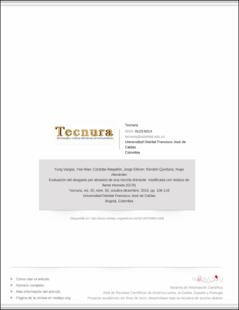Evaluación del desgaste por abrasión de una mezcla drenante modificada con residuo de llanta triturada (GCR)
Evaluation of abrasion of a modified drainage mixture with rubber waste crushed (GCR)
Artículo de revista
2017-02-01
Tecnura
Colombia
Contexto: Las mezclas asfálticas drenantes son definidas como aquellas cuyos vacíos con aire oscilan entre 20% y 25%, y emplean como ligante, un asfalto modificado con algún polímero principalmente elastomérico. A diferencia de otros estudios reportados sobre el tema, se evaluó el efecto de la temperatura de mezcla entre el asfalto modificado con GCR y el material pétreo (160 ºC y 170 ºC), y la variación de las temperaturas de compactación para cada una de ellas (110 ºC, 130 ºC, 150 ºC) y (150 ºC, 160 ºC 170 ºC) respectivamente.
Método: El presente estudio evaluó en laboratorio, la resistencia al desgaste por abrasión (ensayo Cántabro) y la rigidez bajo carga monotónica (ensayo Marshall) y cíclica (módulo resiliente) que experimentó una mezcla asfáltica drenante MD fabricada con asfalto modificado con grano de caucho reciclado de llanta (GCR) por vía húmeda (se modifica el asfalto con el GCR a alta temperatura). Como asfalto base para la fabricación de las mezclas se utilizó cemento asfáltico CA 60-70 (PG 64-22).
Resultados: se reporta un incremento notable en la resistencia al desgaste por abrasión, a la resistencia bajo carga monotónica y la rigidez bajo carga cíclica de la MD cuando se modifica con GCR.
Conclusiones: Como conclusión general se resalta la influencia que tienen las temperaturas de mezcla entre el asfalto y el GCR, así como la de compactación (asfalto modificado y agregado) sobre el comportamiento de la MD modificada con GCR. Context: Porous asphalt mixtures are defined as an asphalt concrete with air voids content of around 20% and 25%, and the typical binder is a modified asphalt with some elastomeric polymer. Unlike other studies reported on the subject: i) The effect of mixing temperature between asphalt modified with GCR and stone materials (160 °C and 170 °C) was evaluated, ii) as the variation of compaction temperatures for each of (110 ºC, 130 ºC, 150 ºC) and (150 ºC, 160 ºC, 170 ºC), respectively.
Method: This study measured in laboratory, the resistance to abrasion (Cantabria trial) and the stiffness under monotonic (Marshall test) and cyclical (resilient modulus) loading of a porous asphalt mixture MD. Asphalt cement CA 60-70 (PG 64-22) was used as binder. This binder was modified with recycling tyre rubber (GCR) by wet way (The GCR and binder are completely mixed to form asphalt rubber).
Results: a significant increase in resistance to abrasion, resistance under monotonic loading and stiffness under cyclic loading of the MD is reported when this mixture is modified with GCR.
Conclusion: The results showed that there is a highlighted influence of mix temperature (between asphalt and GCR) and compaction temperature (modified asphalt and aggregate) on the behavior of the MD modified with GCR.
Descripción:
Evaluación del desgaste por abrasión de una mezcla drenante modificada con residuo de llanta triturada (GCR).pdf
Título: Evaluación del desgaste por abrasión de una mezcla drenante modificada con residuo de llanta triturada (GCR).pdf
Tamaño: 1.085Mb
 PDF
PDF
 LEER EN FLIP
LEER EN FLIP
Título: Evaluación del desgaste por abrasión de una mezcla drenante modificada con residuo de llanta triturada (GCR).pdf
Tamaño: 1.085Mb
 PDF
PDF
 LEER EN FLIP
LEER EN FLIP
















